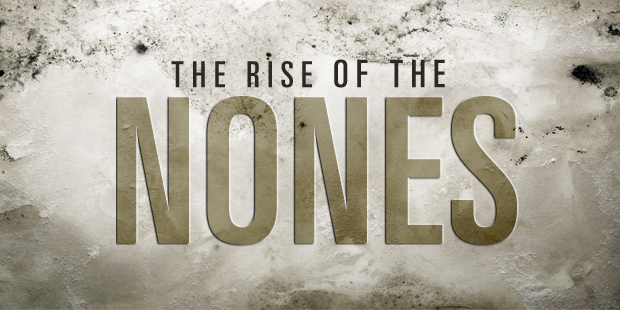In recent years, sociologists of religion and other academics have become increasingly aware of a new category of Americans, the so-called "nones". They are the ones who choose "atheist," "agnostic," or "no religion" on questionnaires, and their numbers have been rising steadily for a couple of decades. The general interpretation of the data has been the actual number of people who used to be religious but now aren't has been rising, but Frank Newport, Editor-in-Chief, at Gallup has recently proposed a different take on the "nones." In a round-table discussion sponsored by the Pew Research Religion & Public Life Project (transcript), he suggests that what has happened is not so much that there has been a conversion process going on—from religious to non-religious—as, rather, that for some reason it is becoming easier or more acceptable for people to say to pollsters that they are they are atheists, agnostics, or otherwise not religious. He argues that the number of religious people has not been declining, at least not very much. What has been happening, instead, is that the number of non-religious people willing to admit they are non-religious is what is rising. What is being measured seems to be a social change in attitude about being publicly non-religious.
Some thoughts. First, church people shouldn't get excited about this because what may be going on here is that our marginal folks, especially among the Protestant denominations and churches, may be finally coming out of the closet. They have sat limp and uninterested on our rolls for many long years and in the past said they were Presbyterians or Methodists or whatever but in fact weren't "religious" at all. The fact of mainline decline is a hard real fact. The fact that the decline is spreading to the Evangelicals is also clear. The rise of the "nones" is a reflection, possibly and in part, on us.
Second, we have to hedge all of this with "possiblies" and "maybes" because the academics involved don't know what is going on, at least not clearly. Newport's thesis makes that abundantly clear. What we know for sure is that the number of people who check the categories of "nones" (atheist, agnostic, no religion) on questionnaires is rising, and that is apparently about all we know for sure about them.
Finally, the point was made in the Pew round table that just because a person selects "no religion"on a questionnaire does not mean that they are actually not religious. It means that they do not identify themselves with any of the other choices offered on the questionnaire. They do not consider themselves "Buddhist" or "Christian" or anything else. The data shows that many of them still pray. They often believe in God or some kind of spiritual presence or force. It is thus even less clear that the number of people who are in one way or another religious is declining in the United States. It is not even clear that the profile of who are religious is changing, that is that they are shifting away from institutional religion to non-instituional religion. It looks as if they were previously non-institutional religious but not as likely to say so to pollsters—and maybe not willing to admit it to their neighbors.
There is a lot for us to think about here.
